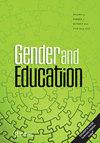作为土著女权主义实践的访问
IF 1.9
3区 教育学
Q2 EDUCATION & EDUCATIONAL RESEARCH
引用次数: 4
摘要
摘要在这篇文章中,来自三个不同社区的四位土著学者将探访视为土著女权主义实践,这种实践是酷儿的、反资本主义的,植根于我们社区的宇宙观。访问是我们如何研究以及如何在研究中建立关系的核心。作为一种土著女权主义实践,探访以关系和关怀伦理为中心。作为一个框架的访问表明,通过我们存在的无常,我们对一个地方的过去和未来负有责任。本文章由计算机程序翻译,如有差异,请以英文原文为准。
Visiting as an Indigenous feminist practice
ABSTRACT In this essay, four Indigenous scholars from three different communities write about visiting as Indigenous feminist practice, a practice that is queer, anti-capitalist, and rooted in the cosmologies of our communities. Visiting is at the heart of how we research and how we make relation within our research. As an Indigenous feminist practice, visiting centers relationality and an ethic of care. Visiting as framework suggests a responsibility to the past and future of a place through the impermanence of our presence.
求助全文
通过发布文献求助,成功后即可免费获取论文全文。
去求助
来源期刊

Gender and Education
EDUCATION & EDUCATIONAL RESEARCH-
CiteScore
5.20
自引率
9.10%
发文量
31
期刊介绍:
Gender and Education grew out of feminist politics and a social justice agenda and is committed to developing multi-disciplinary and critical discussions of gender and education. The journal is particularly interested in the place of gender in relation to other key differences and seeks to further feminist knowledge, philosophies, theory, action and debate. The Editors are actively committed to making the journal an interactive platform that includes global perspectives on education, gender and culture. Submissions to the journal should examine and theorize the interrelated experiences of gendered subjects including women, girls, men, boys, and gender-diverse individuals. Papers should consider how gender shapes and is shaped by other social, cultural, discursive, affective and material dimensions of difference. Gender and Education expects articles to engage in feminist debate, to draw upon a range of theoretical frameworks and to go beyond simple descriptions. Education is interpreted in a broad sense to cover both formal and informal aspects, including pre-school, primary, and secondary education; families and youth cultures inside and outside schools; adult, community, further and higher education; vocational education and training; media education; and parental education.
 求助内容:
求助内容: 应助结果提醒方式:
应助结果提醒方式:


